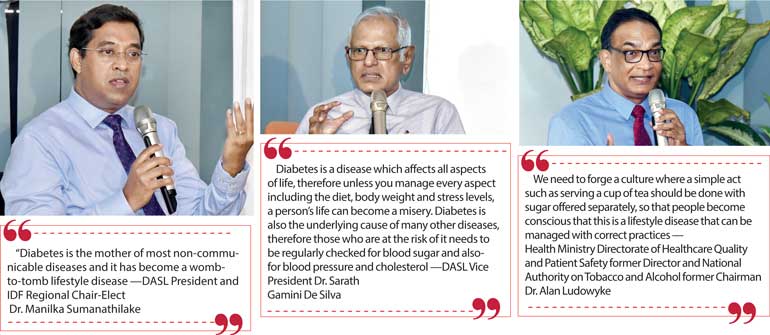Tuesday Feb 24, 2026
Tuesday Feb 24, 2026
Friday, 14 November 2025 00:00 - - {{hitsCtrl.values.hits}}

By Randima Attygalle
DIABETES is a serious public health issue here at home, with one in five Sri Lankans affected by this silent epidemic. One of the seven countries and territories in the International Diabetes Federation (IDF) South-East Asia Region, Sri Lanka has the third highest number of adults (20-79 years) with diabetes in the Region.
At the press briefing marking the 30th anniversary of the National Diabetes Centre, (NDC) which is the clinical arm of The Diabetes Association of Sri Lanka (DASL), its President and IDFs Regional Chair-Elect, Dr. Manilka Sumanatilleke remarked that around 40% of the Sri Lankan population remains undiagnosed or untreated for diabetes.
“Diabetes is the mother of most non-communicable diseases and it has become a womb-to-tomb lifestyle disease,” said Dr. Sumanathilake who cited cardiovascular diseases, kidney failure, vision loss and lower limb amputation among the leading morbidities and other life-altering effects caused by diabetes. The Western Province of the country has the highest prevalence of diabetes in the county, given its more urbanised lifestyle that triggers the disease.
Types of diabetes
The most common types of diabetes are type 1, type 2 and gestational diabetes (diabetes during pregnancy). Type 1 diabetes is caused by an autoimmune reaction which stops the body from making insulin. This type is largely diagnosed in children and young adults and is less common than type 2. With type 2 diabetes, your body doesn’t use insulin well and can’t keep blood sugar at normal levels. It develops over many years and is usually diagnosed in adults, but today it is prevalent even among children, teens, and young adults. Being overweight, having a family history of
diabetes and being physically inactive makes a person more susceptible to type 2 diabetes. However, lifestyle modifications can prevent or delay the onset of this type.
Gestational diabetes develops in pregnant women who have never had diabetes. If a pregnant woman has gestational diabetes, her baby could be at higher risk for health problems. Gestational diabetes usually goes away after childbirth, however, it increases a woman’s risk for type 2 diabetes later in life.
Type 5 diabetes, known as Malnutrition-Related Diabetes Mellitus (MRDM), is a distinct form of diabetes linked to chronic undernutrition and health disparities. It is most common in low- and middle-income countries and affects individuals with a low body mass index (BMI). Local research related to this type is presently being done.
National Diabetes Centre
At a time when diabetic care and other related services were largely confined to the government sector, the NDC became a pioneering centre of excellence, inspiring the establishment of numerous private diabetes clinics island-wide and thereby significantly improving access to diabetes care across the country. As the clinical arm of DASL, in October 1995, NDC opened its doors to serve people living diabetes, those at risk and the general public. A member of the International Diabetes Federation (IDF), NDC’s committed team of professionals comprising medical practitioners, healthcare professionals, nutritionists and dieticians, provides affordable or free services including diabetes education, awareness and screening sessions to economically challenged people living with diabetes. The Insulin Bank of NCD established in 1998, provides free insulin, glucose meters, strips and screening to young people living with type 1 diabetes to improve diabetes control and well-being.
Holistic care
The holistic care provided by NDC helps people living with diabetes manage their lifestyle and lead a normal life of quality, observed DASL’s Vice President, Dr. Sarath Gamini De Silva. “Diabetes is a disease which affects all aspects of life, therefore unless you manage every aspect including the diet, body weight and stress levels, a person’s life can become a misery. Diabetes is also the underlying cause of many other diseases, therefore those who are at the risk of it needs to be regularly checked for blood sugar and also-for blood pressure and cholesterol,” said Dr. De Silva who went on to note that NDC is committed to conveying this message to all those who seek its services. The senior consultant also emphasised on the importance of seeking proper professional diabetes-care instead of resorting to ad hoc treatment, often hyped on social media.
Informed decision-making
Driving home the message that informed decision-making is critical to managing diabetes, former Director of the Directorate of Healthcare Quality and Patient Safety (Minister of Health) and Former Chairman of the National Authority on Tobacco and Alcohol, Dr. Alan Ludowyke stated that people living with diabetes need to be supported by family and society at large to keep the disease at bay. “We need to forge a culture where a simple act such as serving a cup of tea should be done with sugar offered separately, so that people become conscious that this is a lifestyle disease that can be managed with correct practices.” The health experts also reiterated on the need for regular physical activity, minimising the intake of fast and processed food and to be more conscious of reading food labels as means of beating diabetes.
Pix by Ruwan Walpola